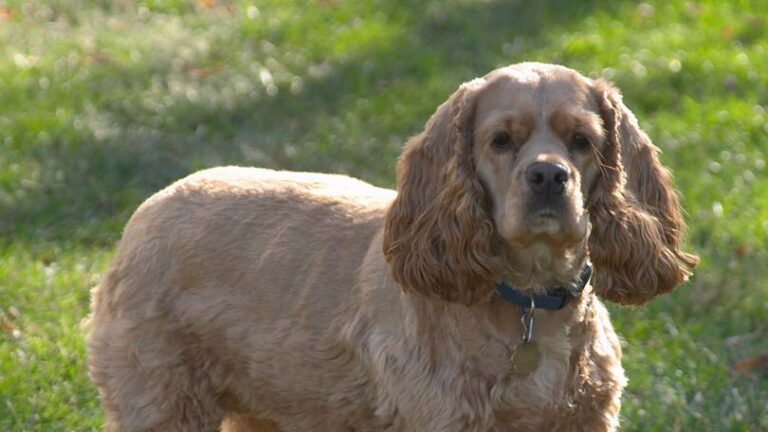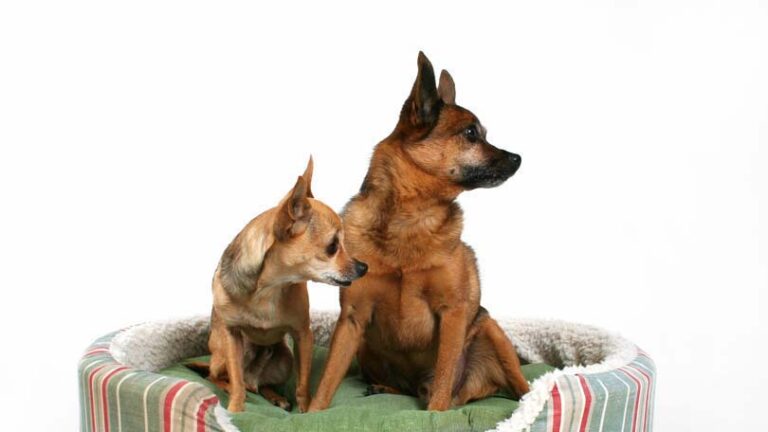How Can I Tell If My Dog Is Pregnant
Are you concerned that your dog may be pregnant? Or, perhaps you are hoping that your dog is pregnant? Sometimes it is difficult to be certain during the first few weeks even if you have witnessed the mating.
There are some signs of possible pregnancy that you can look for:
- Has your dog recently been in season? Your female dog can only get pregnant if she has been in season and if she has had access to a male dog. If your female dog normally plays with a male dog, even if both are intact, there is no danger of pregnancy unless she has been in her heat cycle. The heat cycle normally occurs twice a year and will usually be accompanied by noticeable vaginal discharges.
- If you think your female dog is pregnant, one sign may be that she will lose her appetite around the second and third week of pregnancy. This usually occurs about the time that the embryos implant themselves in the uterine wall and may be associated with a change in hormones.
- Your bitch may begin sleeping more in the first few weeks. Again, this may be related to changing hormones.
- Your female dog may show a change in her nipples if she is pregnant. Female dogs which are not pregnant normally have small, flat nipples but, as your dog’s body prepares for pregnancy, her nipples will begin to enlarge for milk production.
These are usually the earliest signs that most people will notice. However, it can be very easy to fool yourself and imagine some of these changes even if your dog is not pregnant.
It’s not usually possible to confirm a pregnancy before about the fourth week. At that time there are several methods you can use:
- There is a pregnancy test specifically for dogs that measures the pregnancy hormone relaxin in your dog’s bloodsteam. Your vet can give this test 22 days after a mating. Don’t bother trying to use a human pregnancy test on your dog. They measure different hormones and different amounts — they do not work.
- A good vet, especially if he or she is skilled in working with breeders, can palpate your bitch’s abdomen and feel the embryos between 28 and 35 days after conception. It takes a good vet to do this (or you can learn to do it yourself). You have to feel in the right place. The embryos are the size of walnuts at this age. If you press too hard you could harm them. But if you are good at this you can get a count of the puppies in your bitch’s uterine horns.
- You can also ask your vet to do an ultrasound after day 28. This is the same as the ultrasound that expectant mothers have and it will show you the tiny puppies in the uterus. This will also give you an approximate puppy count. However, keep in mind that things can happen between the time you see the puppies in the ultrasound and the time your bitch delivers. She may not deliver all of the puppies that you see on the monitor. It’s always possible that she can reabsorb one or two, or even an entire litter. It’s always a good idea to come back the week before the puppies are due in order to get an x-ray of your bitch’s uterus so you will know how many puppies to expect her to deliver. That way you will also know when she is through whelping.
You can also watch for these signs that your bitch is pregnant and that the pregnancy is progressing normally:
After the first four to six weeks your bitch should show an increase in appetite. Feed her normally for the first month and then you can gradually begin to increase her food. Feed her normal food and don’t add a lot of supplements. Over-supplementing, especially with calcium, can lead to eclampsia and other problems with the pregnancy.
By four to six weeks you will probably start noticing that your bitch is gaining some weight. Your bitch will continue to gain weight for the next few weeks until delivery, especially if she is carrying a normal-sized litter for her breed. If she is only carrying one or two puppies she may not gain much more weight. Don’t stuff her with food. Bitches who are fat have a harder time delivering. You should try to help your bitch get a little exercise each day. Muscle tone will help her have an easier delivery.
After about six weeks you should start feeling the puppies moving around some in your bitch’s abdomen. They will move more as the delivery approaches.
As delivery gets very close, your bitch may show a little milk from her nipples.
Your bitch will also begin to exhibit nesting behavior. Be sure that you don’t allow her to go outside and dig dens. Dogs have a built-in instinct to make dens and some dogs, even the most pampered, are determined that their puppies should be born in a hole in the dirt. This is not where you want your girl to have her puppies. Make her a good whelping area in the house, but be prepared for her to look for areas that she prefers.
Finally, your bitch has a normal temperature of about 101 degrees F. As her delivery time approaches you should be taking her temperature rectally twice a day. When her temperature drops below 99 degrees F and stays there for 12 hours, whelping is close.
Be sure you’re ready for the delivery! Have her whelping area set up with newspapers or clean end roll paper from your newspaper company. Have blankets nearby. Have some scissors so you can cut the umbilical cords. Have some towels so you can dry off the newborns. Make sure the room is warm so the newborns won’t be chilled. Otherwise, try to stay out of your girl’s way. She will likely know what to do, even if this is her first time. Just stand by and be ready to help if she needs you.
After the delivery you can give your girl some vanilla ice cream (lots of sugar and the calcium will be good) or some broth to help give her some strength. Spend some time with her and the newborns. You both have a lot of work ahead of you but for now you can enjoy the babies.

Having discovered a fondness for insects while pursuing her degree in Biology, Randi Jones was quite bugged to know that people usually dismissed these little creatures as “creepy-crawlies”.







